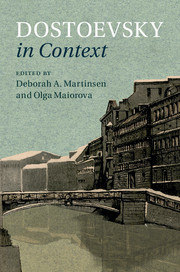Book contents
- Frontmatter
- Contents
- List of illustrations
- Notes on contributors
- Acknowledgments
- Note on citation, transliteration, glossary, and dates
- Chronology
- 1 Introduction: the many worlds of Dostoevsky
- PART I SOCIAL, HISTORICAL, AND CULTURAL CONTEXTS
- PART II LITERATURE, JOURNALISM, AND LANGUAGES
- 25 Modern print culture
- 26 Realism
- 27 Dostoevsky: translator and translated
- 28 Travel and travel writing
- 29 Folklore
- 30 Foreign languages
- 31 Theater
- 32 Dostoevsky's journalism and fiction
- 33 Dostoevsky's journalism in the 1860s
- 34 Dostoevsky's journalism in the 1870s
- 35 Censorship
- Glossary
- Further reading
- Index
- References
35 - Censorship
from PART II - LITERATURE, JOURNALISM, AND LANGUAGES
Published online by Cambridge University Press: 18 December 2015
- Frontmatter
- Contents
- List of illustrations
- Notes on contributors
- Acknowledgments
- Note on citation, transliteration, glossary, and dates
- Chronology
- 1 Introduction: the many worlds of Dostoevsky
- PART I SOCIAL, HISTORICAL, AND CULTURAL CONTEXTS
- PART II LITERATURE, JOURNALISM, AND LANGUAGES
- 25 Modern print culture
- 26 Realism
- 27 Dostoevsky: translator and translated
- 28 Travel and travel writing
- 29 Folklore
- 30 Foreign languages
- 31 Theater
- 32 Dostoevsky's journalism and fiction
- 33 Dostoevsky's journalism in the 1860s
- 34 Dostoevsky's journalism in the 1870s
- 35 Censorship
- Glossary
- Further reading
- Index
- References
Summary
Dostoevsky wrote at a time when Russian imperial censorship imposed restrictions on all aspects of print production: the writing, editing, and publishing of books and periodicals; the printing houses; the book trade that encompassed importation, sales, and translations; the accession and sale of printing equipment; book circulation; collections of lending libraries; presentations of dramatic works; pictorial reproductions; and postal services. Censorship policies encouraged writers to practice self-censorship and editors to reject or make cuts in manuscripts that might present an element of risk. The use of “Aesopian” language, allegory, innuendo, and many other devices to counteract censorship became widespread, and readers learned to read between the lines.
Russia's first Censorship Statute of 1804, introduced under Alexander I (1801–25), set up a system that entrusted censorship to the Ministry of Education and required university professors to act as pre-publication censors. The Statute prohibited publications that contravened Orthodoxy, autocracy, or moral conscience. In 1826, the reactionary Nicholas I (1825–55) established the Third Section of his Chancellery, a political police with regulatory power over censors. According to the 1828 Statute on censorship (comprising 117 articles), no work could be published if it contained “anything that might shake the doctrine of the Orthodox Church, its traditions and rituals,” “anything violating the inviolability of the supreme sovereign power” and “respect for the Imperial House,” or anything “contrary to indigenous government regulations” and insulting to “good morals and decency.” The Minister of Education and chairman of the Directorate of Censorship, Sergei Uvarov, soon launched his triad-slogan “Orthodoxy, Autocracy, Nationality*,” also known as the doctrine of “official nationality,” and directed educators and censors to adopt it. In 1848, in response to revolutions in Europe, Nicholas I established the secret Buturlin Committee to enforce further limits on censors and the media. Stringent censorship policies, often communicated as “Circulars,” demanded uncritical conformity to official ideology, leading to the construction of a homogeneous worldview. By the time Dostoevsky began publishing in the mid-1840s, censorship requirements were an ever-present reality for writers.
Writing about censorship in the 1870s, Dostoevsky recalled that in the 1840s censors “strictly suppressed” “every new idea” and forbade “almost everything” – even lines and dots were suspect as allegories or lampoons (23:32; WD 1:507; 21:29; WD 1:153).
- Type
- Chapter
- Information
- Dostoevsky in Context , pp. 295 - 302Publisher: Cambridge University PressPrint publication year: 2016



